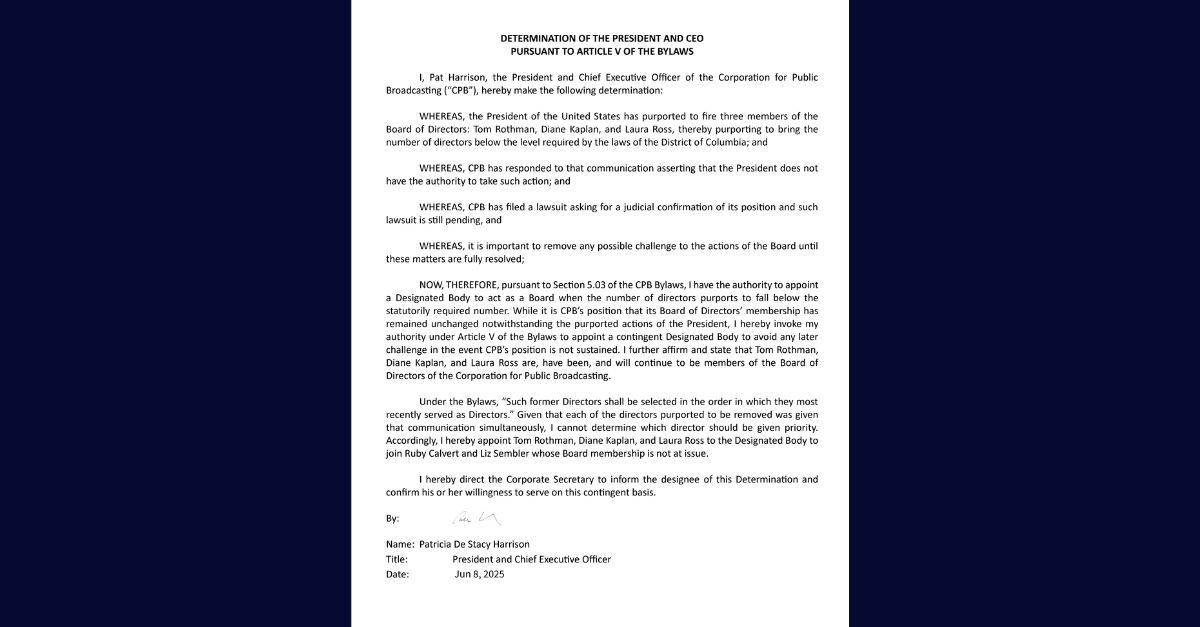
U.S. Attorney for the District of Columbia Jeanine Pirro waits for President Donald Trump to arrive to speak with members of law enforcement and National Guard soldiers, Thursday, Aug. 21, 2025, in Washington (AP Photo/Jacquelyn Martin).
Former Fox News host and current U.S. Attorney Jeanine Pirro is once again asking a federal judge to declare that President Donald Trump lawfully fired a Corporation for Public Broadcasting (CPB) board member and that she is “ousted and excluded” from that role, claiming that an apparent backup plan to keep her in place indefinitely should also fail.
When Pirro in mid-July brought the quo warranto action, a legal maneuver aimed at challenging a person”s right to hold a public or corporate office, the case was filed against CPB board members Diane Kaplan, Laura G. Ross and Thomas E. Rothman on grounds that they had “usurped their former offices” and carried on at work despite Trump’s April firings. In the weeks that followed, however, the DOJ voluntarily dismissed claims against Rothman and Ross because they sent letters to CPB CEO Patricia Harrison stating, “I no longer hold or exercise the position of Director of the Corporation for Public Broadcasting.” That left Kaplan the lone defendant.
“Any way you slice it, under executive removal precedents or under D.C. corporate law, the President had the power to remove Defendant at will,” the U.S. Attorney’s Office for the District of Columbia argued. “The Court should grant summary judgment to the United States and enter judgment ousting Defendant from her unlawfully usurped office.”
According to Pirro, Kaplan should not only be ousted for the reasons the lawsuit outlined initially, but also because evidence indicates she’s been trying to cling to a job through a CPB-created failsafe as CPB’s separate lawsuit continues.
“On August 26, 2025, Defendant contended for the first time that in the alternative to serving as a Board member, she has been named by the CPB’s Chief Executive Officer to ‘a contingent designated body’ under Article V of the CPB’s Bylaws,” court documents said. “That evening, Defendant’s counsel sent to the United States’ counsel the document purporting to make the appointment, which is attached as Exhibit 1. The document is dated June 8, 2025, and purports to be e-signed by Ms. Harrison on June 9, 2025.”
“It purports to ‘appoint a contingent Designated Body . . . in the event CPB’s position [in CPB v. Trump] is not sustained.’ It states that Mr. Rothman, Ms. Kaplan, and Ms. Ross will serve on the Designated Body alongside” Chair Ruby Calvert and board member Liz Sembler, the government went on.
The attached court exhibit shows that Harrison in June invoked CPB bylaws to “appoint a Designated Body to act as a Board when the number of directors purports to fall below the statutorily required number” of three amid litigation and uncertainty over the efficacy and lawfulness of the Trump firings.

Court exhibit shows CPB CEO Patricia Harrison appointing ‘Designated Body.’
Pirro stated that this backup or contingency plan could provide a way for Kaplan, if she is not still actually a board member, to stay on as a member of the “contingent designated body” until Trump nominates and the U.S. Senate confirms her replacement.
“[T]here are practical differences between service as a Board member and service on a designated body as a former Board member. Most important, service on a designated body is inherently temporary. If this Court rules that Defendant has been removed as a Board member but continues to serve on a designated body, the President can nominate Defendant’s replacement, subject to Senate confirmation,” the filing said, adding: “Thus, if the President appoints and the Senate confirms a third Board member, any purported service on a designated body by Defendant would cease.”
“By contrast,” the DOJ continued, “Defendant’s primary contention in this case and in CPB v. Trump is that she has the right to serve on the Board until her term expires. Accordingly, an order affirming Defendant’s ouster from the Board would provide redress to the United States by confirming the government’s ability (through presidential appointment and Senate confirmation) to terminate any continued service by Defendant.”
In any event, logic determines that Kaplan can’t be “currently serving on a designated body,” said Pirro:
Defendant is not currently serving on a designated body, and it is uncertain whether she ever will. The appointment document purports to “appoint a contingent Designated Body . . . in the event CPB’s position [in CPB v. Trump] is not sustained,” an event that has not yet occurred. The President has the right to appoint new Board members (subject to Senate confirmation) at any time, and Defendant does not dispute that there are currently several vacancies on the Board. It is therefore uncertain whether there will be less than three Board members, a necessary condition for a designated body under the Bylaws, if and when the Court rules against the CPB in CPB v. Trump.
Love true crime? Sign up for our newsletter, The Law&Crime Docket, to get the latest real-life crime stories delivered right to your inbox
CPB v. Trump refers to the lawsuit CPB filed in April claiming that Trump had “no power to remove or terminate” Kaplan, Rothman and Ross in “one sweeping act of executive overreach.”
The suit sought a restraining order that was later treated as a preliminary injunction request, but a federal judge — not convinced at that stage that Trump lacked authority to remove the board members — ruled in June that the plaintiffs “failed to carry their burden of demonstrating that they are likely to prevail on the merits of their claim for injunctive relief or that Plaintiffs are likely to suffer irreparable harm in the absence of preliminary relief.”
U.S. District Judge Randolph Moss reasoned at the time that although “Congress made clear that it intended that the Board of Directors perform its duties outside the government and without government or political influence,” the board could still function with two members and “important questions regarding the status of the Corporation and its relationship with the federal government” would have to be answered “another day.”
Pirro most recently sought summary judgment in the case, from which Rothman and Ross have also been dismissed.
CPB, a private nonprofit corporation created by Congress in 1967 to promote the “growth and development” of public broadcasting across the country, currently lists Kaplan as an active board member along with Calvert and Sembler on its website; Rothman and Ross are listed as former board members.
While Kaplan and Rothman were appointed by then-President Joe Biden, Ross was appointed by Trump during his first term and then again by Biden. All three were confirmed by the U.S. Senate, as the Public Broadcasting Act of 1967 requires; there are nine board members in total at a full-staff level, and “no more than 5 members of the Board appointed by the President may be members of the same political party.”
Read the government’s filing here.

